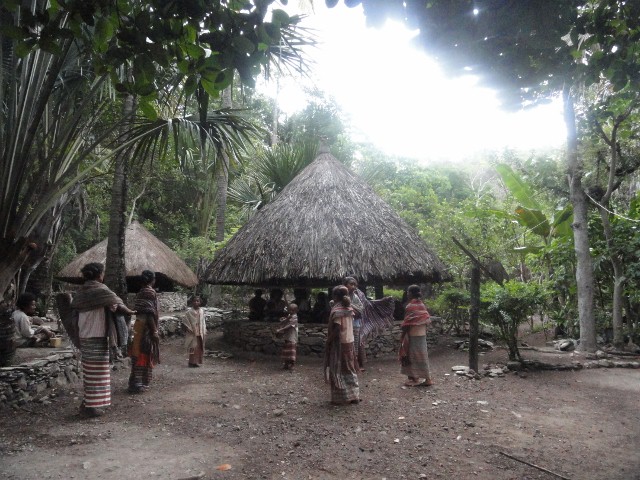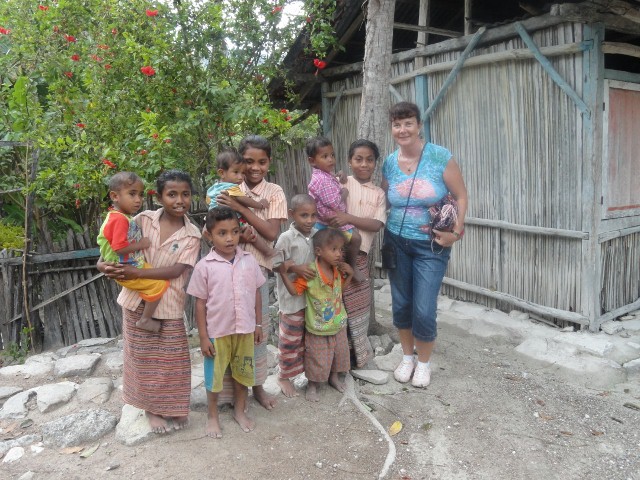The last kingdoms.

Rhiann Marie - Round the World
Stewart Graham
Thu 2 Dec 2010 13:27
|
Thursday 2nd December 1049 Local 0249
UTC
09:53.02S 122:46.50E
Early morning Tuesday we rendevoused on the shore
with our guide Onny, and the fisherman who would look after our RIB for the day.
We were whisked by motorbike to the guides home and we waited for his friend
Forkez the driver to come. We headed off out of town and stopped at a roadside
food vendor for some local food to eat for breakfast.
We then headed East and climbed steadily into the
hills high above Kupang. The life was enthralling to look at. The housing
quickly changed to a mix of tradional and "modern". Maderm was small and square
and built in concrete with a corrugated iron roof. Traditional was with
a grass thatched roof and bamboo walls. There was generally a living house
and also an impressive round house ( like a beehive) behind for
cooking, storing and for the women to have the babies in ..... (don't ask -
I'm only telling you what I was told). The thatch on these came right to
the ground.
In other parts there were round houses built to the
front but without sides and these seemed to be for sitting , meeting and
generally pottering around. They were shady, dry and airy - and most were
beautifully built.
We were bound for a large traditional market at
Oinlasi in Soe district, where we would see villagers from all over the
region with their different traditional ikat dress and varied produce. The last
time I had seen anything like this was in India. We were I think the most
interesting thing on display there for a lot of those at the market. One young
girl almost jumped out of her skin when she turned right in front of me only to
be confronted with an Urang Bule! We will try to post some photos which can do
this justice but I fear it will be impossible.
Once in the hill villages the chewing of Bettel
Nuts was ubiquitous. This is quite bizarre to see at first. Peoples tongues and
lips are bright red their teeth are red and black and they continually spit out
the excess bloody looking "juice". This keeps them "up" apparently a bit like
tobacco but looks to us like something out of a C rated horror
movie!
On we went up the arduous route to Boti one
of the last kingdoms in Timor. The route was barely passable and at times we had
to be out of the vehicle pushing it and in fact on the return we had a load of
villagers helping the car up a slippery rocky slope. This is an orthodox animist
village where the head of the community is the King. Their life is structured
around 9 days each with a special focus and where the ninth day is the day
of reflection and rest and where the elders gather with the king to plan the
next nine days. The second day is fire, then, children, continuity of jobs,
possitive thinking, (I'm fortunate to have seven of these most weeks), nature,
health, and then reflect again and plan what the next nine days should
achieve. They believe in a god of the earth, Uis Pah and another
in heaven Uis Neno. Needless to say a good reference from the god on the earth
will do your prospects no harm with the god in heaven.
Men when they get married never cut their hair
and wear it in a bun on their head. When a child
has a new brother or sister in the making it's head is shaved. We saw a few of
them. When a baby is born the mother visits the king to tell him she has
delivered one "who will work hard in the field" or "weave beautiful textiles" or
such like. After 40 days there is a naming ceremony where the baby is placed in
coconut water and the king splashes water on the baby to make the baby cry. All
the villagers present at the ceremony shout out suggested names and
whichever is the last name to be called before the baby stops cring is
the chosen name.
When a wife or husband is taken they have to move
to the village and after three years the king will call the one from the village
who chose and check up with them if they are happy with their choice. If so
fine. If not they are free to choose another. As they don't accept the
materiality of the modern world they don't welcome gifts from out side. The
dowry for a wife is the smallest amount of money possible.
If a villager is accused of say, stealing something
then the king will call them to his house and if the person has stolen say
a pig. He will be told to keep it as he must need it more than others and the
king with then instruct
the other villagers to bring a pig each to
that person so that he has enough and does not need to steal. If it was bananas
then they would all plant a banana tree for him.
The village was incredibly peaceful and we were
welcomed sincerely and warmly and were given tea and food was made for us. The
women then played music and the others danced it was a beautiful
sight.
Everyone was very gentle and warm but we both felt
that the men were all a little effeminate. One of them we could not tell
whether it was a woman or a man but were assured it was a man. On the day we
visited they were all sitting around the king, one making a ball of string from
natural fibre, another carving a spoon from a coconut shell, another unpicking a
piece of woven packaging. Undoubtedly however this was a unique kingdom and was
a very peaceful, harmonious and serene
place.
After barely making it back across the tortuous
route to the road and Trish's nerves in tatters we finished the day with a long
drive through the wet season daily downpour to one of the worst "hotels" I have
ever stayed in in my life. Yes. Interesting.
In the evening we went to another food vendor
(restaurant - ish) to try another regional variation of the wonderful food that
we have so far experienced in Indonesia. We had asked Onny to introduce us to as
much local food as possible and he was certainly doing a good job. He said he it
was unusual but he was happy to have people to guide who wanted
to get off the beaten track and experience local
culture.
Tomorrow would be another
day.
|

